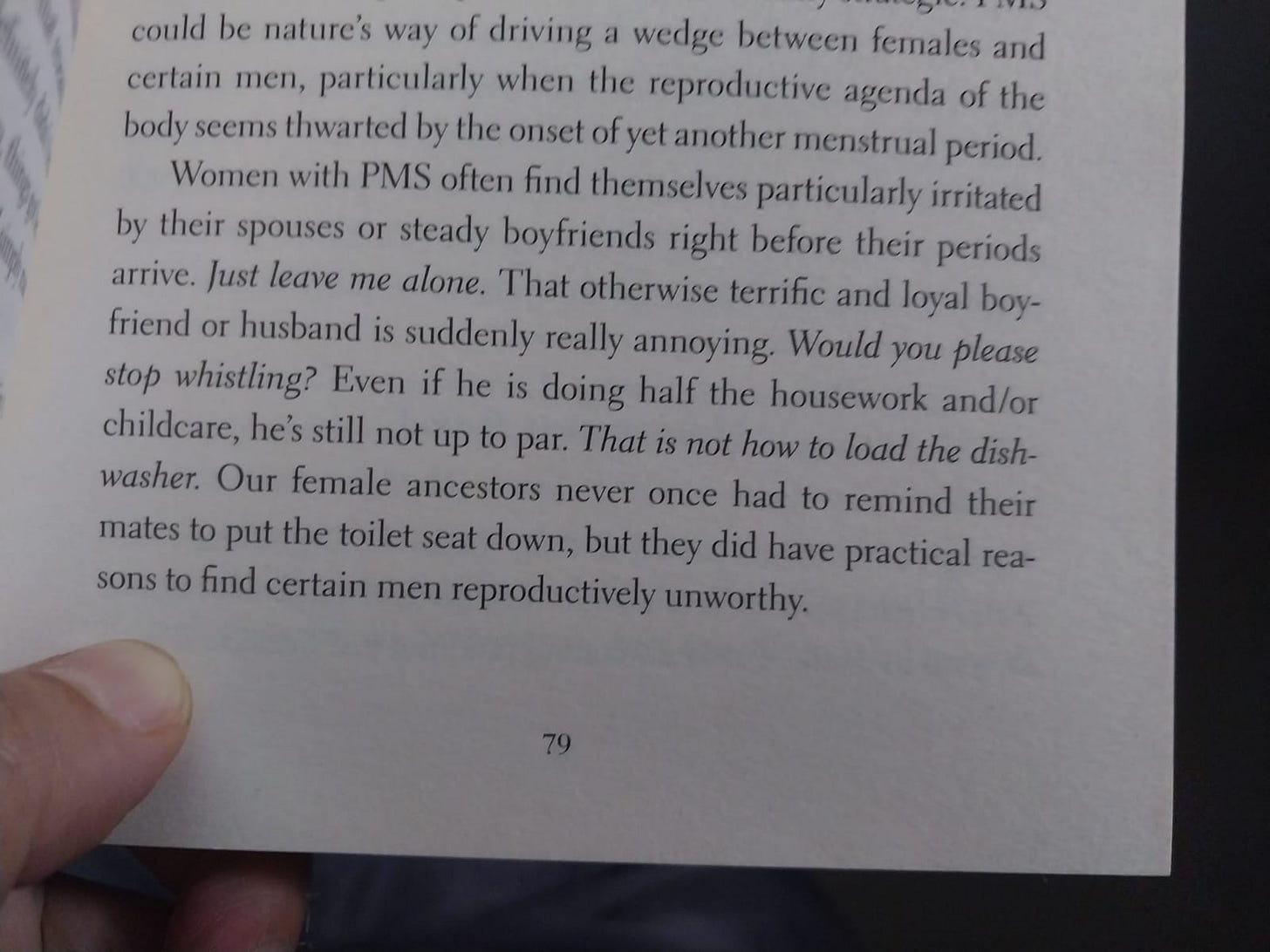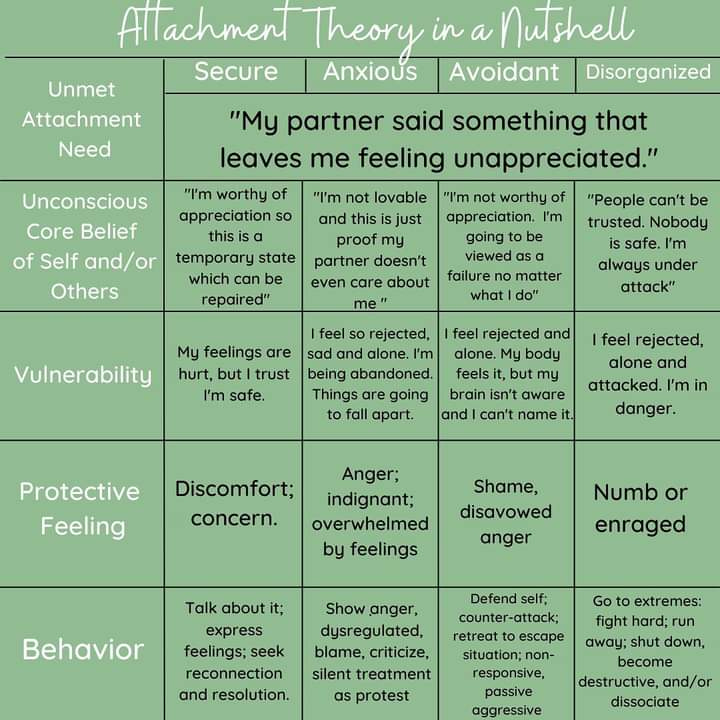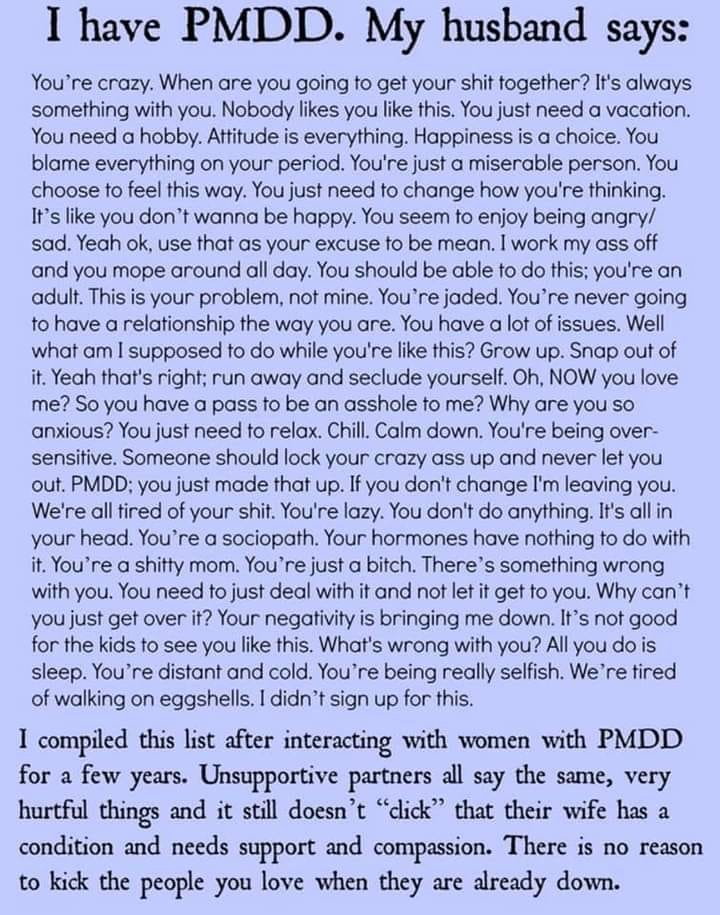A Life Less Miserable is a free publication that aims to integrate personal experience, peer-reviewed research, and practical tips about premenstrual disorders, ADHD, and other mental-health-related topics. If you enjoy this content, consider sharing it or buying me some chocolate instead.
A fun premenstrual symptom that many women report is feeling super fucking irritated by their romantic partner once a month - and anecdotes on forums such as r/pmdd point to it being more common when dating a male partner, although women dating women experience this symptom too.
While it’s one of the more common symptoms that women post about, it’s not an official symptom of PMDD, although it may be hard to define diagnostically.
However, in the DSM-5 diagnosis criteria for PMDD, we’ve got:
One or more of the following symptoms must be present:1) Marked affective lability (e.g., mood swings, feeling suddenly sad or tearful, or increased sensitivity to rejection)2) Marked irritability or anger or increased interpersonal conflicts1
And at least five symptoms out of a list that includes difficulty concentrating, hypersomnia or insomnia, a sense of feeling overwhelmed or out of control, physical symptoms such as breast tenderness or bloating, and other fun stuff to pick and (not) choose from.
But if you head to these forums, some of the more common posts are variations of,
“I think about breaking up with my partner once a month over issues I don’t care about the rest of the month. Which part of me is real?”
Or partners posting:
For some women, by the way, the symptoms are becoming more jealous or insecure, worrying that their partner will cheat on them or leave them.
It's hard to draw the line when it's highlighting real issues, whether in ourselves or our relationship, and just how much our hormones are distorting our perception.
Also, some women feel differently towards their partner around ovulation, while for others, it hits before menstruation.
The personal corner:
I was recently reading through old messages between my ex and I. It wasn't obsessive; reading through them didn’t feel unhealthy. But certain things will hit me with a bang.
For example, I’d read texts filled with positive interactions—sharing, joking, and working through conflicts lovingly and respectfully. Then, something in the way I write changes. Something comes off as unforgiving, educating, and distant. My heart sank. I must be premenstrual, I thought. In several cases, I even wrote, "I'm PMSing." Or a few days later, in a separate conversation, completely unrelated, something like: “I just got my period.”
At the time, my awareness of my premenstrual symptoms was growing. I was using an app to track my cycle, and I knew that interpersonal conflicts would increase in the days before my period. It started right after ovulation (I have more information about my patterns now - it’s a frustratingly slow work in progress).
But when I was in the midst of it, what was going on in my mind circled back to things like, “I'm more sensitive now because I’m struggling with PMDD. He’s not supportive enough, so even though I’m embarrassed about how I said what I said, I’m still right.”
Because I couldn’t recognize what kind of support I needed and all the ways my cycle (or however we’re referring to what’s going on) was impacting how I perceived things, I couldn’t accept the ways he was trying to support me and where he wasn’t able to. I was snapped out of partnership mode and started seeing him as someone who was against me.
And at the same time, it wasn’t all me. My ex had his own mental health issues, and he wasn't able to support me in the way I needed. Having a mental health issue like PMDD may make it more likely to end up in a relationship with someone else who also has mental health issues.
What’s going on here?
First of all, the state of current research is pretty bleak.
The evolutionary psychology theory is this: Your body is geared up to evaluate whether he's a good partner. You'll soon know whether he got you pregnant or not. Can he also provide? This way, PMS can be an evolutionary advantage by breaking up incompatible bonds that won’t lead to pregnancy, leading to improved reproductive outcomes.2
Whether or not you subscribe to that, there are plenty of reasons why your tolerance and feelings for your partner would vary, and it makes sense that hormonal fluctuations would affect them - along with whether you've been getting enough sleep and whatever life stressors you have.

Increased need for alone time
Many women report a greater need for alone time during the luteal period. When we cannot get the rest and solo time our bodies require, we can experience increased irritability. Furthermore, one of the symptoms of PMS is increased irritability—double irritability! When we’re stressed and irritable, we’re more likely to notice everything our partner is doing wrong and imagine that our lives would be better without them.
Reaction to emotional stimuli
Women react more quickly and accurately to angry and sad stimuli during their luteal period.3 This means that you may be more aware of (and reactive to) subtle cues in your partner’s facial expression or body language that show they’re in a bad mood. Your reaction may then lead to a response in your partner, and now you’re in a negative interaction.
Attachment styles
Even in a relatively secure relationship, stress can lead to insecure behaviors in someone with a less-than-secure attachment style. And experiencing symptoms like exhaustion and mood swings every three weeks is definitely stressful.
The stress of not getting the proper support
Stress increases premenstrual symptoms, and interpersonal conflicts cause stress. Sometimes, our partner doesn't know how to support us, and sometimes, they're really not interested. When it's PMDD-level symptoms, it can be hard to see clearly which is which.
At this point, I was going to link to a study that was cited in the paper about evolutionary advantages I referenced earlier, but they’re behind paywalls, so fuck that. Instead, I will quote:
Marital relationships of PMS sufferers deteriorate during the luteal phase, whereas relationship satisfaction is similar between PMS and nonPMS sufferers during the follicular phase (Ryser and Feinauer 1992). Of course, male behaviours are also part of this equation, and it is known that male partners often respond to premenstrual symptoms by avoidance and withdrawal (Cortese and Brown 1989), increasing the likelihood of estrangement. Comparisons between the quality of life in the follicular versus luteal phases of PMS sufferers show the greatest relative decline in attitudes towards immediate family and marital status (Halbreich et al. 2003).
Studies suggest that women in relationships with other women report greater premenstrual understanding. Couple’s therapy increased relationship satisfaction in women with moderate to severe PMS, so it’s evident that the quality of support within the relationship has a significant impact on these symptoms.
Sexual or gender-based trauma
Before you dismiss me for being woo-woo, hear me out.
We know there’s a link between trauma and premenstrual disorders. In one study, 83% percent of women with PMDD reported early life trauma, with emotional abuse being the most common at 71%4. A survey of Arab women from several countries found a strong association between PMS/PMDD symptoms and sexual harassment. 5
Is it so far-fetched to consider that some of the rage you feel towards your male partner at this time could be related to the suppressed rage of years of oppression by men? Whether it’s sexual harassment on the street or “get back in the kitchen” jokes (and usually both), these experiences aren’t uncommon.
Or we read headlines about a study that found that husbands create an extra seven hours of work for women, and it’s just something that’s filed away in the brain until you go to make yourself a snack and see that he left crumbs by the sink and didn’t wash his plate, and he’s watching TV while the kids are running around. And then it’s not just the crumbs but the number of times you were expected to get up and help with the dishes while the brothers and male cousins continued to sit and chat.
Wouldn’t that make a little bit of sense?
Honestly, women put up with a lot of shit. And we’re expected to keep smiling and working hard to prove that we deserve equality. Maybe our high estrogen-driven empathy blinds us to that sometimes, and then once in a while, a part of us goes, “Hey. Remember this? It’s enraging!”
So maybe give yourself a break. Instead of telling yourself you’re crazy for being “so emotional,” show yourself some love. Take time for yourself to do something soothing or fun.
If you knew what I knew, you would be angry too.
Further reading
Hormonal: The Hidden Intelligence of Hormones -- How They Drive Desire, Shape Relationships, Influence Our Choices, and Make Us Wiser by Martie Haselton
Knowledge is power. Understanding what’s going on with your hormones and the different needs you have as you move through your cycle can help you and your loved ones learn to manage.
Nonviolent Communication: A Language of Life by Marshal Rosenberg
Now that we’ve accepted the possibility of increased conflict during Luteal, how can we handle it? NVC is a good tool for helping you identify and communicate your needs to the people around you.
The High-Conflict Couple by Alan E. Fruzzetti
If you’re having a lot of conflict with your partner, this book offers some practical DBT techniques for improving your relationship.
You Are The One You’ve Been Waiting for by Richard Schwartz
This book focuses on romantic relationships using the Internal Family Systems modality. The book helps you improve your relationship by improving your connection with yourself.
Reid, R. L. (2017, January 23). Table 1, Diagnostic Criteria for Premenstrual Dysphoric Disorder (PMDD). Nih.gov; MDText.com, Inc. https://www.ncbi.nlm.nih.gov/books/NBK279045/table/premenstrual-syndrom.table1diag/
Gillings, M. R. (2014). Were there evolutionary advantages to premenstrual syndrome? Evolutionary Applications, 7(8), 897–904. https://doi.org/10.1111/eva.12190
Derntl B, Hack RL, Kryspin-Exner I, Habel U. Association of menstrual cycle phase with the core components of empathy. Horm Behav. 2013 Jan;63(1):97-104. doi: 10.1016/j.yhbeh.2012.10.009. Epub 2012 Oct 23. PMID: 23098806; PMCID: PMC3549494.
Kulkarni, J., Leyden, O., Gavrilidis, E., Thew, C., & Thomas, E. H. X. (2022). The prevalence of early life trauma in premenstrual dysphoric disorder (PMDD). Psychiatry Research, 308, 114381. https://doi.org/10.1016/j.psychres.2021.114381
AbdelQadir, Y. H., Assar, A., Abdelghafar, Y. A., Kamal, M. A., Zaazouee, M. S., Elsayed, S. M., Ragab, K. M., Nabhan, A. E., Gamaleldin, N. A., Moris, M. S., AL-Masri, B. E., El-Sherif, D. M., Mohamed Goudy, Y., Khaled Alsiouty, A., Mahmoud, M. M., Faragalla, H. M., Abdelazim, E. A., Mohamed, N. A.-H., Elsayed, S. I., & Shehata, H. H. (2022). Prevalence and patterns of premenstrual disorders and possible association with sexual harassment: a cross-sectional study of young Arab women. BMC Women’s Health, 22(1). https://doi.org/10.1186/s12905-022-02130-0












This was such a wonderful read, full of so many great resources (and memes)!
Love this. Explains so much and really helpful in developing some self-compassion 💜